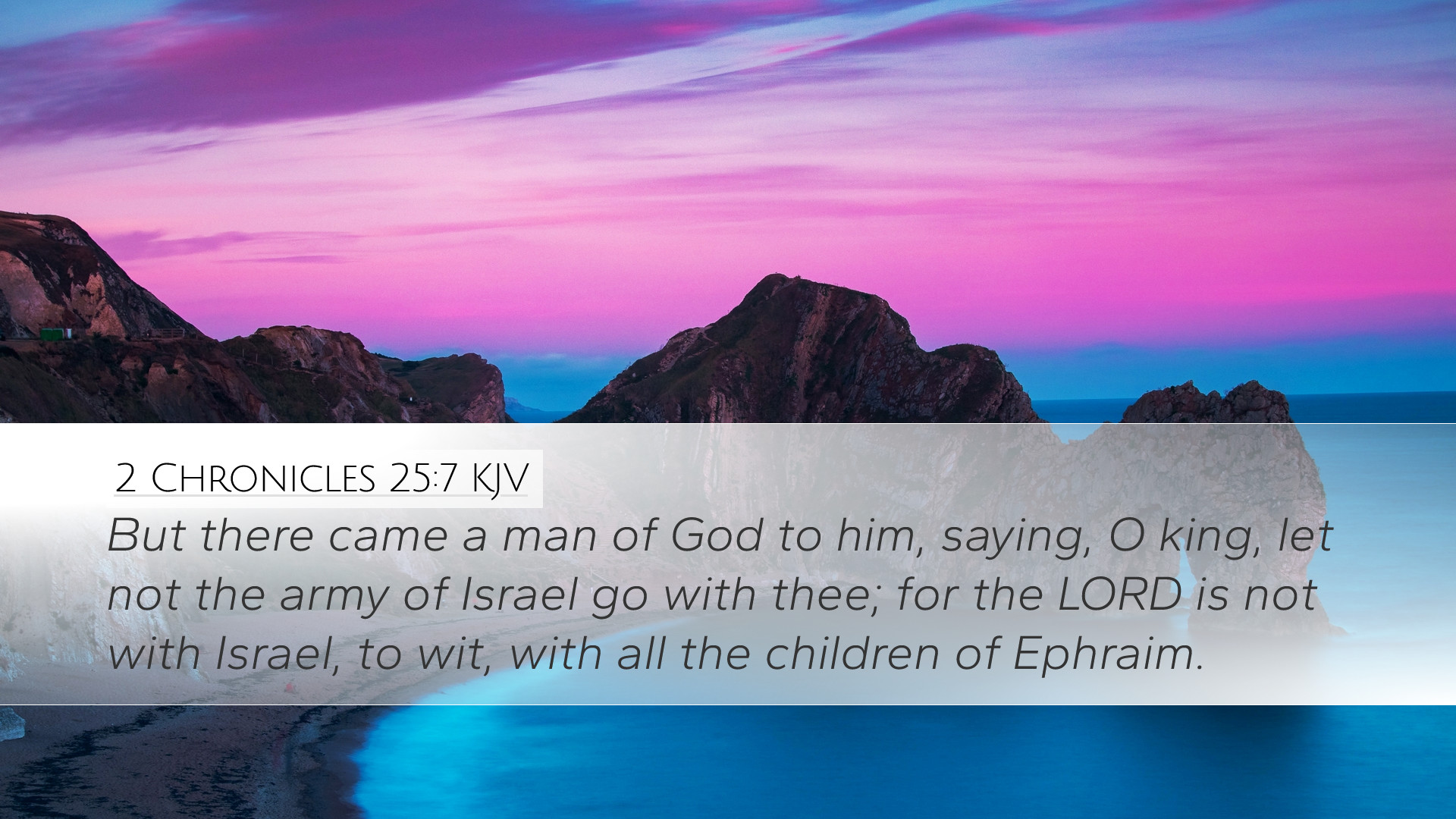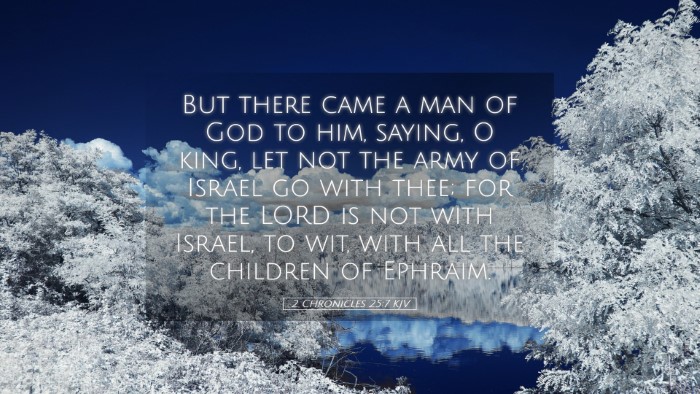2 Chronicles 25:7 - Commentary and Insights
Verse Context: 2 Chronicles 25:7 states: "But a man of God came to him, saying, 'O king, do not let the army of Israel go with you, for the Lord is not with Israel; to wit, with all the children of Ephraim.'" This verse captures a pivotal moment in King Amaziah's reign over Judah as he contemplates going to war against Edom.
Overview of 2 Chronicles 25
The chapter records the narrative of King Amaziah's military initiative, his disobedience to divine counsel, and the subsequent consequences. The presence of a "man of God" underscores the theme of prophetic guidance, highlighting the significance of divine direction in leadership.
Insights from Public Domain Commentaries
1. Matthew Henry's Commentary
Matthew Henry emphasizes the critical role that prophetic voices play in the lives of rulers. He notes that the "man of God" serves as a reminder that God's authority supersedes human ambitions, particularly in military endeavors. Henry points out that Amaziah's initial willingness to pay for mercenaries reveals a lack of faith in God's provision.
- Prophetic Obedience: The divine message encourages submission to God's guidance, emphasizing that human wisdom cannot rival God's understanding.
- Judgment on Israel: Henry highlights that the Lord's distancing from Israel serves as a warning about aligning with those under divine disfavor.
2. Albert Barnes' Notes
Albert Barnes provides an analytical approach to the text, offering historical and theological insights. He underscores that the "man of God" is an envoy of divine instruction, representing a divine perspective amidst worldly planning.
- Divine Sovereignty: Barnes stresses that God holds authority over the outcome of battles and thus, followers must seek divine approval before embarking on endeavors.
- Consequences of Disobedience: Illustrating the gravity of the warning, he asserts that Amaziah's potential alliance with Israel could lead to catastrophic consequences.
3. Adam Clarke's Commentary
Adam Clarke elaborates on the nature of divine intervention, emphasizing the "man of God" as a crucial mediator between the divine will and human actions. Clarke interprets this verse as an illustration of God's mercy, providing guidance just in time to avert disaster.
- Importance of Heeding Warnings: Clarke notes that the failure to heed divine counsel is often a precursor to failure in human endeavors, particularly in matters of national significance.
- Character of Amaziah: He discusses Amaziah’s character, cautioning that his actions exhibit a mix of bravery and folly, indicative of a leader lacking complete reliance on God.
Theological Themes
- Divine Guidance: This passage highlights the need for leaders to seek God’s direction, particularly in matters of great consequence.
- Separation from the Wicked: The verse signals the importance of maintaining a holy separation from those who are not aligned with God's purposes.
- The Role of Prophets: It accentuates the vital function of prophets in reminding rulers of God's will and the consequences of straying from it.
Applications for Today's Leaders
The exhortation of 2 Chronicles 25:7 resonates with contemporary spiritual leaders, reminding them of their need for divine counsel in their decision-making processes.
- Seek Divine Approval: Pastors and church leaders should prioritize prayer and biblical consultation before embarking on major projects or initiatives.
- Emphasize Holiness: The call for leaders to remain separate from the ungodly is relevant in today's context, urging leaders to take the moral high ground in all interactions.
- Heed Warnings: Recognizing and responding to the prophetic voice becomes essential, understanding that ignoring divine warnings can lead to severe setbacks.
Conclusion
The message of 2 Chronicles 25:7 serves as a timeless reminder of the necessity of divine consultation for leaders. Drawing from the collective insights of revered commentators, it stresses the importance of adhering to God's will, the dangers of self-reliance, and the crucial role of prophetic wisdom. As theologians, pastors, and scholars delve deeper into this passage, they are invited to reflect on their own reliance on God and their commitment to spiritual leadership that is guided by divine wisdom.


